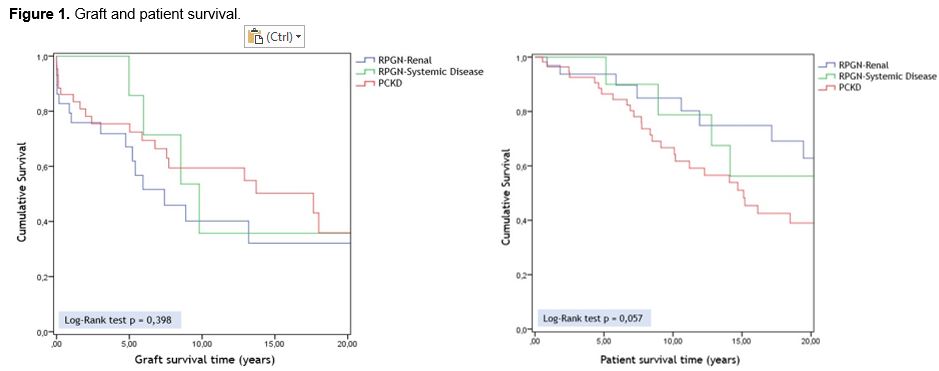Session Information
Session Type: ACR Poster Session B
Session Time: 9:00AM-11:00AM
Background/Purpose: Rapidly Progressive Glomerulonephritis (RPGN) is characterized histology by presence of crescents and clinically by rapid and severe decline in kidney function. Thus, it may lead to an end stage renal disease (ESRD), with renal transplantation (RT). RPGN can be primary, with no extra-renal involvement (RPGN-renal-limited), or secondary to systemic autoimmune disorders (RPGN-SAD), infections or drugs. RT in RPGN-SAD may be associated to a worse outcome. In a series of patients with first RT due to RPGN our aim was to assess: a) long-term post-transplant survival (PTS) in RPGN-SAD, b) comparison of PTS between RPGN-SAD and RPGN-renal-limited and c) comparison of both RPGN (SAD and renal-limited) with a control group of non-immunological disorder, the polycystic kidney disease (PCKD).
Methods: We studied 3 groups: a) RPGN-SAD (granulomatosis with polyangiitis (3), microscopic polyangiitis (6), Goodpasture syndrome (2)), b) RPGN-renal-limited and c) PCKD (control). All were transplanted in a single reference University Hospital. Main outcome variables were: a) graft and patient PTS up to 20 years and b) evolution of renal function (serum creatinine and proteinuria) in the first 5 years. Cumulative survival rates after RT were estimated by the Kaplan-Meier method and compared between groups with the log-rank test. Kruskal-Wallis or chi2/Fisher’s exact tests were used to compare quantitative or qualitative variables, respectively.
Results: We included 100 patients with RT: a) RPGN-SAD group (11), b) RPGN-renal-limited group (32), and c) PCKD group (57). There were no significant differences at baseline between the two RPGN groups in sex, age and cardiovascular risk factors. RPGN group showed higher cholesterol levels than PCKD at the time of RT (p=0.041) with no other significant differences. Renal biopsy had been performed in the 43 patients with RPGN: types I (27.9%), II (4.7%) and III RPGN (41.9%); 25.6% had not classified RPGN (no immunofluorescence was performed at the time of the biopsy). From 89 patients (of 100) in which a renal biopsy was performed during the first-year post-transplant, rejection was found in 33 patients (37.1%) with no significant differences between the 3 groups (5 cases in RPGN-SAD group, 11 in RPGN-renal-limited group and 17 in PCKD group; p=0.592). Evolution of serum creatinine and the proteinuria after the transplant is shown in TABLE 1. There were no significant differences between the 3 groups in serum creatinine, graft and patient PTS.
Conclusion: RT could be the best option in ESRD due to RPGN regardless of systemic manifestations.
TABLE 1. Evolution of creatinine and proteinuria levels after RT.
|
|
1 Month |
6 Months |
1 Year |
3 Years |
5 Years |
||||||||||||||||
|
Serum Creatinine mg/dL |
RPGN-renal-limitedl |
RPGN-SAD |
PCKD |
Total |
RPGN-renal-limitedl |
RPGN-SAD |
PCKD |
Total |
RPGN-renal-limitedl |
RPGN-SAD |
PCKD |
Total |
RPGN-renal-limitedl |
RPGN-SAD |
PCKD |
Total |
RPGN-renal-limitedl |
RPGN-SAD |
PCKD |
Total |
|
|
N |
27 |
11 |
51 |
89 |
24 |
9 |
48 |
81 |
24 |
8 |
46 |
78 |
20 |
9 |
41 |
70 |
14 |
10 |
36 |
60 |
|
|
Mean±SD |
1.81±0.9 |
2.09±1.65 |
2.23±1.75 |
2.08±1.52 |
1.97±1.34 |
1.54±0.37 |
1.74±0.77 |
1.79±0.95 |
1.80±1.11 |
1.48±0.40 |
1.74±0.88 |
1.73±0.92 |
1.69±0.76 |
1.70±0.69 |
1.69±0.91 |
1.69±0.83 |
1.64±0.80 |
1.81±0.99 |
1.82±1.29 |
1.77±1.13 |
|
|
Proteinuria mg/24 h |
RPGN Renal |
RPGN Systemic |
PCKD |
Total |
RPGN Renal |
RPGN Systemic |
PCKD |
Total |
RPGN Renal |
RPGN Systemic |
PCKD |
Total |
RPGN Renal |
RPGN Systemic |
PCKD |
Total |
RPGN Renal |
RPGN Systemic |
PCKD |
Total |
|
|
N |
22 |
9 |
45 |
76 |
23 |
6 |
45 |
74 |
20 |
7 |
41 |
68 |
19 |
7 |
40 |
66 |
13 |
8 |
31 |
52 |
|
|
Mean±SD |
474.86±432.03 |
1127.67±2590.44 |
408.22±449.00 |
512.71±968.84 |
611.87±832.20* |
797.00±556.29* |
362.98±323.38* |
475.53±561.34* |
656.10±1206.68 |
340.57±175.22 |
282.54±272.35 |
398.38±698.81 |
510.79±832.90 |
272.57±291.20 |
340.65±344.17 |
382.41±527.44 |
238.23±311.19 |
443.88±300.87 |
579.26±1114.5 |
473.17±887.08 |
|
*p<0.05
To cite this abstract in AMA style:
Atienza-Mateo B, Sánchez-Bilbao L, Martín-Varillas JL, de Cos-Gómez M, González-Mazón Í, Prieto Peña D, Calderón Goercke M, Rodrigo Calabia E, Ruiz San Millán JC, González-Gay MA, Blanco R. Long-Term Survival of Renal Transplantation in Rapidly Progressive Glomerulonephritis (RPGN). Study of 43 Cases from a Single Center [abstract]. Arthritis Rheumatol. 2018; 70 (suppl 9). https://acrabstracts.org/abstract/long-term-survival-of-renal-transplantation-in-rapidly-progressive-glomerulonephritis-rpgn-study-of-43-cases-from-a-single-center/. Accessed .« Back to 2018 ACR/ARHP Annual Meeting
ACR Meeting Abstracts - https://acrabstracts.org/abstract/long-term-survival-of-renal-transplantation-in-rapidly-progressive-glomerulonephritis-rpgn-study-of-43-cases-from-a-single-center/

